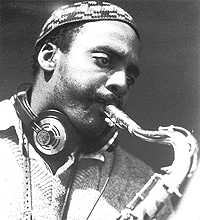Saxophone Prolificus
Honorary Texas Tenor David Murray
By Jay Trachtenberg, Fri., Feb. 20, 1998
 Jazz saxophonist David Murray hasn't played in Austin for over a decade, but he has bittersweet memories of his last visit here. Back in 1984, fronting an amazing all-star octet that included the likes of Julius Hemphill and Craig Harris, Murray's band played on consecutive nights at the Ritz Theater on Sixth Street to the same 40-50 people. "I remember that tour," says Murray over the phone. "I lost my shirt. I came back to New York $15,000 in the hole. That's when I started the big band at Sweet Basil. I was paying the guys on stage a certain amount and then the guys from the octet were coming to the back door and I was paying them off from the tour. That's how that worked."
Jazz saxophonist David Murray hasn't played in Austin for over a decade, but he has bittersweet memories of his last visit here. Back in 1984, fronting an amazing all-star octet that included the likes of Julius Hemphill and Craig Harris, Murray's band played on consecutive nights at the Ritz Theater on Sixth Street to the same 40-50 people. "I remember that tour," says Murray over the phone. "I lost my shirt. I came back to New York $15,000 in the hole. That's when I started the big band at Sweet Basil. I was paying the guys on stage a certain amount and then the guys from the octet were coming to the back door and I was paying them off from the tour. That's how that worked."
Such is the life of a jazz musician, especially when it comes to pecuniary matters. Artistically, however, Murray has few peers and is universally regarded as one of the foremost players in jazz. Ask any self-respecting jazz fan who could possibly claim heir apparent status to Sonny Rollins' sax throne, and you'll more than likely hear the name David Murray offered up. Described by one music writer as a "brilliant improviser, adept multi-instrumentalist, talented arranger and gifted composer," Murray earned the Village Voice's "Jazzman of the Eighties" honor for good reason; he was then, and continues to this day, to be a beacon of diverse creativity with a prolificacy that is downright staggering. He has probably recorded more albums for more record labels than any other jazzman in the past two decades.
In that time, Murray has fronted/recorded with a remarkable array of musical configurations: an all-star big band, an octet, various quartets, trios, numerous duets, and as a solo artist. He continues to co-lead the renowned World Saxophone Quartet, and in more recent years has worked on various projects with the Grateful Dead and the Skatalites. Murray's two most recent albums, Windward Passages, a set of duets with pianist Dave Burrell on the Italian Black Saint label, and Fo Deuk Revue, a cross-cultural, jazz/world/hip-hop extravaganza recorded in Senegal with West African musicians, are just two of several new, recently completed projects. Still awaiting release are works featuring Duke Ellington's music with a big band and 43-piece string section, a gospel album with Fontella Bass, and a second jazz/world music album with musicians from the French Caribbean island of Guadalupe.
Seems there's not much Murray hasn't done, and his history bears this out. Arriving in New York from California in 1975, Murray wasted little time in making his presence known. The free-blowing, experimental "loft scene" was in full swing and the Oakland-born saxophonist came to town fully prepared to join the fracas, having already played and studied with the likes of former Austin "free" trumpeter Bobby Bradford and saxman Arthur Blythe.
Within a year, Murray was the most talked about young horn player in New York. His playing brought together the gospel and soul roots of his formative years in Oakland, with the large-toned swing of Coleman Hawkins and Ben Webster, the physically muscular attack of Sonny Rollins, and the outside-cum-gospel sensibility of Albert Ayler. It was a formidable combination, especially for a youngster barely out of his teens, and it made players and critics alike sit up and take note. And Murray was only getting started. Before the end of the Eighties, he was flying high as a quarter of the groundbreaking World Saxophone Quartet with Texan Julius Hemphill, Oliver Lake, and Hamiett Bluiett. As with the rest of his career, Murray's continuing tenure in the WSQ illustrates his penchant for working with seasoned musicians.
"People think I'm older than I am now, because I always seemed to flock to the older musicians rather than guys my age," says Murray, 44 years old today (Thursday). "When I came to New York, the first thing I did was call up [legendary drummer] Eddie Blackwell. `Hey man, I want you to play in my band.' And he said, `Sure!' The fact that you could do that is great. That's why I don't understand a lot of kids today. They come to New York and call up the guy they were in college with to play drums when there are people of Blackwell's level already here in New York. They don't call them, they call these younger guys. I just don't understand that. When I was younger and growing so rapidly I couldn't think of playing with guys my age. I wanted to play with the best."
It is this creative thirst that has fueled Murray's amazing track record of musical projects and recordings that is simply unparalleled by any other jazz musician over the past 20 years. The early Eighties saw an astounding flurry of activity, particularly within his quartet with pianist John Hicks, which was tearing up New York City clubs. "During the Eighties, I thought I had one of the strongest groups in New York. You could hear it, we worked a lot together. I'm not bragging, it was just a good group."
Not surprisingly, Murray has continued his active pace into this decade. One of the strongest jazz offerings of the past few years was Murray's octet recording, Dark Star: The Music of the Grateful Dead from 1996, which came about after Murray performed with Jerry Garcia and company at Madison Square Garden in 1992.
"Where the Grateful Dead and jazz meet is improvisation," says Murray. "They were the band that played the most free. They actually jammed and improvised on all of their songs. They opened them up and weren't limited in that way. There are bands that play the same notes every night. The Dead were the complete opposite of that. I fit right in. It was perfect for me. The minute we played together it was happening!"
Another interesting collaboration was Murray's recording with the Skatalites, the Jamaican creators of the jazz-infused precursor to reggae (who will also be in town this weekend). Must have been nice to blow on that wicked tropical groove?
"Hell yes!" enthuses Murray. "That's the epitome of being laid back - playing ska music. All you've got to do is just relax, and if you can get that much together, you've got it. If you can relax, you're in the concept, you're right there already."
One of the great ironies faced by most jazz musicians - and Murray is no exception - is finding far greater acceptance and appreciation for their music in Europe and Japan than here at home. He is constantly in demand overseas, which is probably why he has lived in Paris for the past two years and the reason that most of Murray's extraordinarily prolific recorded output is on foreign record labels - labels that afford him more artistic freedom than domestic ones.
"Although they're not major labels," explains Murray, "we're allowed to do exactly what we want to do, which in this business is great. If I were with a major label you could find my records everywhere, but perhaps I might not have the control. If I could find a major label that would do exactly what I want to do, we're on."
Not "smooth jazz."
"I want my records to sound like my band sounds live," says Murray. "I don't like that fabricated, syrupy sound that a lot of cats play these days. I've never been into it. I don't like the mixes. Just give me the music the way it sounds in the living room."
In spite of his current expatriate status, Murray holds a true affinity for the Lone Star State, noting that many of the musicians he played with growing up in California were from Texas.
"I'm actually part of the Texas tradition even though I'm not from Texas - but vicariously through Bobby Bradford, John Carter, and Julius Hemphill. These are some of my teachers. So I've got the whole Texas kinda thing. It's just a whole rich tradition of Texas playing that I like, especially tenor saxophone. To be able to master the middle of the horn like they do and play all those special notes with a fat quality to 'em."
"And then there's the big band tradition out of Texas. North Texas State is legendary in big band playing and writing around the United States. I've played with Fathead Newman and he says, `Y'know, you're kinda like a Texas tenor kinda guy.' I also spend time in Texas now because my father lives in Midland."
As an innovative warrior who has taken jazz into so many creative areas and has stretched its boundaries over the years, Murray is in a particularly knowledgeable position to comment on the neo-conservative trend (read: Mr. Wynton Marsalis) that has dominated the current state of the music.
"I think it sounds a little limited," says Murray thoughtfully. "I'm here in New York and I'm just hearing the return to bebop with younger faces. I just wish there were more disciples of the music from Seventies artists or even disciples of Ornette Coleman, Cecil Taylor, and Sun Ra. I wish there were more people following in that direction, because people of that era defined their concept through composition that was very creative. I don't hear as much creativity now. But things go in cycles and that cycle will come back around again."
This isn't to say, however, that one should expect a well-mannered, run-of-the-mill jazz show when Murray plays the Bates Recital Hall this Saturday, February 21. Austin jazz fans are in for a real treat considering the quartet Murray is bringing with him; Andrew Cyrille is perhaps the quintessential free-jazz drummer best known for his work with Cecil Taylor, while veteran bassist Fred Hopkins, who comes out of Chicago's esteemed AACM and teamed with Henry Threadgill in the revered group Air, has played off and on with Murray for 20 years. Pianist D.D. Jackson is a disciple of the late Don Pullen and is currently one of the most talked about young players in jazz. With Murray's incendiary saxophone igniting the fireworks, this promises to be an event that Austin jazz fans will long remember.
"I've always been one to defy rules," points out Murray. "Being a horn player, we live for being able to stretch out, that's what we're all about."
Jay Trachtenberg is the host of "Jazz, Etc.," which broadcasts Wednesdays, 8:08pm-midnight, on KUT 90.5, as well as "Jazz Junction," which can be heard Sundays 11am-noon on KGSR 107.1.








